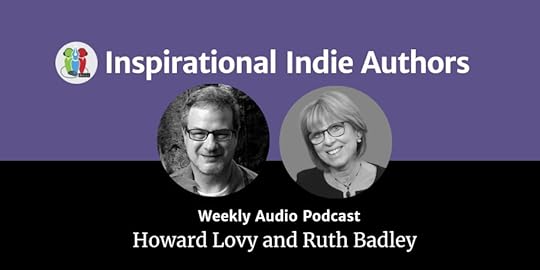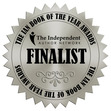Ruth Badley's Blog, page 3
July 16, 2020
A talk and reading for The Junction, Dubai
I was part of Dubai’s theatre community for the two and half years I lived in the United Arab Emirates and made many friends there. It was great to reconnect with that community for the venue’s Live Instagram Series and to explain what I’ve been doing since moving back to the UK! Click on link to watch. For more info on Where are the grown-ups? https://amzn.to/2tNvGBj
How to turn your family history into a book
Before the Covid-19 crisis forced the cancellation of shows and exhibitions, Family Tree Magazine had asked me to run a workshop for budding writers at their planned event in London. When everything moved online I put together some tips and advice for magazine subscribers writers looking to turn their family history research into a compelling narrative. For more info on Where are the grown-ups? http:// https://amzn.to/2tNvGBj Click on link to watch video.
June 24, 2020
A presentation to the Jewish Genealogical Society of Great Britain
A presentation, reading and Q&A with members of the Jewish Genealogical Society of Great Britain. Do genealogists always know what happens to the information they uncover? Perhaps not. This was one way I could let them know how valuable their work is to people like you and me, and how the answers to my questions inspired me to write a book. https://amzn.to/2tNvGBj
June 8, 2020
Talk and Q&A for Watford Writers
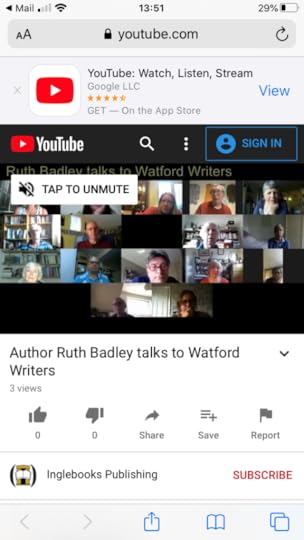
Thanks to zoom, a planned presentation on Where are the grown-ups? went ahead on 1 June 2020
A thoroughly enjoyable and stimulating discussion with fellow writers on my approach to memoir. https://amzn.to/2tNvGBj
For more information about Watford Writers https://watfordwriters.org/
The full session available on YouTube https://youtu.be/d0Oicz9IjwE
June 7, 2020
Tell your 2020 story
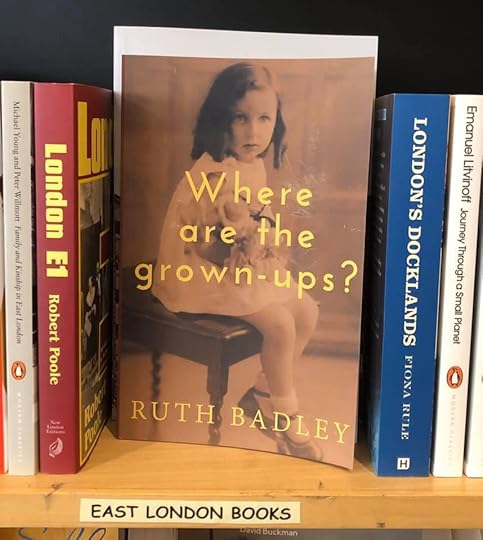
The global pandemic that killed thousands. The deliberate murder of a black man by a police officer in America. This is 2020, and this is now, but historians in 50, or 100 years will need first-hand experience and eyewitness accounts to understand the impact of these terrible events on real people — people like you and me and our families. It may be deeply personal but it will also be tomorrow’s authentic and valuable social history.
The tragedies we have witnessed in the past weeks and months might already be prompting memories of experiences and frustrations, missing loved ones and past lives lived. Maybe people and events you haven’t reflected on for years have bubbled to the surface. Telling your truth can be a helpful way to process those thoughts and validate your feelings.
I’m a journalist and freelance writer, and when I worked for a local newspaper I spent much of my time interviewing people on my patch and telling their stories. Occasionally I had the opportunity to write a detailed account. Even back then I knew I could never be a fiction writer because to me real people’s lives are more fascinating than anything I could invent.
Writing about yourself and your family is exactly that territory. Real people, real events, in a specific period of past time. I told it like it was for me, as a child in London during the 1960s and for my mother, adopted as a newborn in 1930, following a tragedy that robbed us both of a significant part of our history. It turned into a book.
I did it and you can too. There are so many more books, crying out to be written and read on the impact of 2020’s multiple tragedies.
As mentioned, I wrote for a newspaper where much of the time I had to write as briefly as possible. There was always a limit on space. Writing a book requires much more detail than I was used to writing. Frankly, I doubted my ability to be able to produce a sustained piece of writing, comprising upwards of 200 pages and to make it so interesting that people would want to read to the end. Maybe, if you’ve read this far, you are wondering how you could do that too. I’m here to tell you, don’t count, don’t worry about the number of pages and how you will achieve it because once you make a start, the ideas and the words will flow and the pages will mount up without you noticing.
There is no right or wrong way to approach this. There is only the right way for you but the following ideas, based on ‘who, what, where and how,’ might give you a way in.
Who are you writing this for?
There are some choices here. Write for a specific audience, comprising just your family and your circle of contacts. Or self-publish your story and release it globally. I chose to write for myself and decided on a wider audience once my material took shape.
Who are you writing about?
Start with yourself. You are part of your family’s larger story. Future generations will want to know how you lived and learn about the challenges you faced. Readers want to connect on an emotional level with characters and be drawn into their world. As writers we want our readers to feel something, to identify with the situations and issues, not just be reading an account of the facts.
Who is telling the story?
If you are the narrator, you will be writing in the first person and then using the third person when talking about your family members. Or you could let a family member tell their own story. Where are the grown-ups? is part-lived experience and part social history. In some parts of the story I am the narrator and writing in the first person. In the parts of the story that are outside my direct experience but based on research, I am writing in the third person but with my knowledge of events I am expressing the feelings and thoughts of the characters in the story.
What is your story?
If you’ve chosen your principal characters you need to decide what their story is about? You will need to show development of your characters through the story — their triumphs, failures, their relationships, losses, the personal conflicts they experienced, and the resolution they found. The overall story may give you a bigger theme.
Investigating and immersing yourself in the emotional truth behind the facts may suggest a wider theme, but this may emerge as the writing progresses.
It wasn’t until I’d completed the first draft of Where are the grown-ups? that I could articulate what my book was really about. My principal characters are myself, my mother Sylvia and my grandmother Rose and my story explores the impact of a domestic tragedy on three generations of a Jewish family.
I didn’t know if it would interest a wider audience than my family and friends. At some stage it’s a good idea to seek feedback on your work from an objective group of fellow writers. You will know from their response if your story has a universal quality that may appeal to a larger community of readers. It’s best not to ask friends and family as they are inclined to tell you your work is brilliant when you need constructive criticism in the first draft stage.
Where is your story?
Are you involved in a Black Lives Matter protest in Washington? Did you lose a much loved family member,to COVID 19 in a hospital or care home? Were you a frontline worker in ICU? Are you calling out acts of racism you suffered as a student on a forum and compelling your university to investigate and take action against those accused? Perhaps you’ve lost your job and are concerned with how you will find another. Or are you still caught up in a lockdown, far from your home country, due to travel restrictions?
How will you tell your story?
To bring your experience alive, use what you know to create scenes and dialogue that show you and your characters living and breathing in their own time.
You will have much more factual information than you need to use. Be selective as not all of it will contribute to the story as a whole, but you need to have done the research to be able to immerse yourself in that world and write about it convincingly.
Focus on life-changing events, the turning points that shaped who you are and give readers a straight route to the emotional heart of your story.
Create some intrigue by starting at a point of interest and not telling the story in strict chronological order. You can go back and forth in time and take your reader with you if you make it clear in the writing.
Writing exercises
Finally, I’d like to suggest some writing exercises to prompt memory and give you a place to start.
Think about three significant episodes in your own life and write down your feelings at the time. Looking back at our own experiences from a distance is a helpful way to give them meaning and insight and gives your writing authenticity.
Thinking about those three significant events in your life that shaped you as a person. What were the news headlines at those times?
Now draft those three scenes, give them some subtle historical context and include some dialogue between you and another character.
Think about the geography of your childhood home and in your mind walk through each room and write down what you see. Look at the furniture, textures, material, colours and objects. When you recall an object that means something to you, focus on that and tell the reader what you know. Which room is it in? Is it visible or inside a cupboard or a drawer? Can you pick it up or is it too big? Explain its significance to you. Is it something you still have?
Looking back at your childhood, write about one significant experience, as you remember it today.Then write the same scene, exactly as you experienced it as a child, in the present tense. What are you seeing, hearing, smelling, tasting and feeling as a child?
If you can work through some of these exercises you may have an early draft of several scenes that you can keep working on and refine. They might not appear in the final draft of your book but they will help you to start thinking like a writer with a story to tell.
May 22, 2020
Interview on Cambridge 105
A pre-recorded conversation about Where are the grown-ups? with presenter Leigh Chambers, broadcast on 22 May 2020. Here’s the link to the book. https://amzn.to/2tNvGBj
May 21, 2020
Reviews for Where are the grown-ups?
‘In the end we can only just write what we see and what we feel and you’ve done that beautifully.’ Jason Solomon BBC Radio London
Part history, part memoir, uncovering secrets, complex attitudes, painful memories, funny memories too – all brought together in this wonderful book.’ Tony Fisher, BBC Radio Essex
‘I’ve read this book! ‘ Jo Good, BBC Radio London
‘Reading Ruth’s story is like listening to a friend you know well. A deeply poignant read.’ Family Tree Magazine
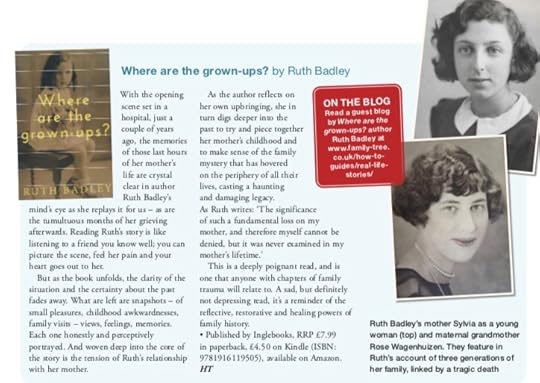 Review of Where are the grown-ups? Family Tree Magazine October 2019
Review of Where are the grown-ups? Family Tree Magazine October 2019‘The characters are sharply etched and keenly observed.’ Love East Magazine
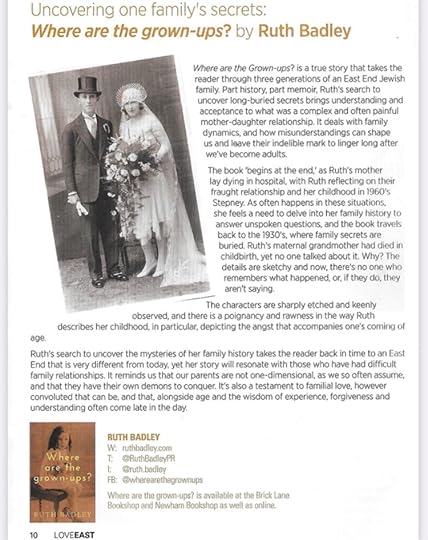
Amazon – Verified Purchasers
‘A beautifully written and sensitive exploration of the authors relationship with her mother and a poignant look at how each generation is shaped by those who came before.‘
‘Integral to the authors writing is a sense of comic timing that enlivens the text with deliciously recognisable humour and laugh out loud moments, whilst the sadness and dignity of the personalities evoked is very moving.‘
‘The writing is fresh, smart and both observational and engaging – the author is a key, brave and sensitive player in this three act drama.‘
‘Superb storytelling and wonderful intertwining of family through the years.‘
‘The author has the skill to make this very personal story into one that many daughters and families will relate to.‘
For more reviews https://amzn.to/2ykp53R
May 20, 2020
Interview on Chat and Spin Radio
Chat and Spin Radio give lots of airtime to authors. On 7 May 2020 I chatted to Ron about the background to Where are the grown-ups? Give it a listen and check out the book. http:// https://amzn.to/3cI2IEz
May 19, 2020
An interview with Howard Lovy for the Alliance of Independent Authors
Grabbing the media spotlight
 Review of Where are the grown-ups? Family Tree Magazine October 2019
Review of Where are the grown-ups? Family Tree Magazine October 2019The following article was written for the Alliance of Independent Authors blog in October 2019
You don’t have to be a celebrity author to get newspapers and magazines to pay attention to your book. Author member and freelance journalist, Ruth Badley, explains how a focused approach can help indie authors secure media coverage and other promotional opportunities.
As an unknown, first-time author I was realistic. I knew I had no chance of interesting the national print or broadcast media in my book, a multi-generational memoir, titled Where are the grown-ups? How could I compete with the big publishing houses who regularly push their authors in the glossy magazines and arts supplements? Having been a journalist myself, I knew, with a bit of research and some creative thinking, certain media outlets were well within my reach.
Whilst
planning my book launch event in East London I identified the main local paper,
community radio station and independent magazine and looked online at the kinds
of articles they published about arts events. It is worth being forensic about
this research to fully understand house styles, who the writers and
broadcasters are, and what might work for their audiences
As a general
rule local newspapers are concerned with ‘news.’ Magazines have a longer lead-in
time so their features are less time-critical.
Where to start
I created a
simple Media Table in Word with three columns where I could log the name of each
outlet and contact details. Later I added the date I approached them and notes
on the actions that followed. I kept
adding to and updating this table as I went along. If you’re in touch with
several media outlets it’s easy to lose track of events and miss an opportunity
because you didn’t make a note of the journalist’s deadline.
Before
contacting the press, I prepared a basic press release for my book that answered
the who, what, why and where questions, to make the story attractive to
journalists. Later I adapted this press release and used it for different
media.
I had a high
resolution headshot of myself and the book cover on file, ready to accompany
the words.
I would
advise speaking to a journalist on the phone first, to sound them out on their
interest, rather than emailing your press release, unannounced, hoping they
notice it. Nine times out of ten they won’t. If they’ve already had a
conversation about it, they might. It will probably need another follow up by
phone and an email re-send for a positive result, but by that time you’ve started
to build a useful relationship.
Communicating
succinctly what a book is about to journalists, on the phone and in a press
release is a valuable exercise. The more you do it, the easier and slicker it
becomes. The East London Advertiser used
my press release in full. It started like this:
East End family tragedy the subject of new book
The death
of a Stepney Green woman following childbirth in 1930 is the premise for a new
book, penned by her granddaughter.
Where are the grown-ups? by Ruth Badley explores the impact of this tragedy on three generations of her family. A presentation and reading by the author takes place at the Half Moon Theatre, Limehouse on 17 July 2019.
 A review in LoveEast magazine
A review in LoveEast magazine
Going
wider
The launch event, was of limited interest to the media outside the immediate location, so for other publications I used a different angle. Another version was prepared for a Jewish weekly, to publicise two speaking events I am involved in with that community.
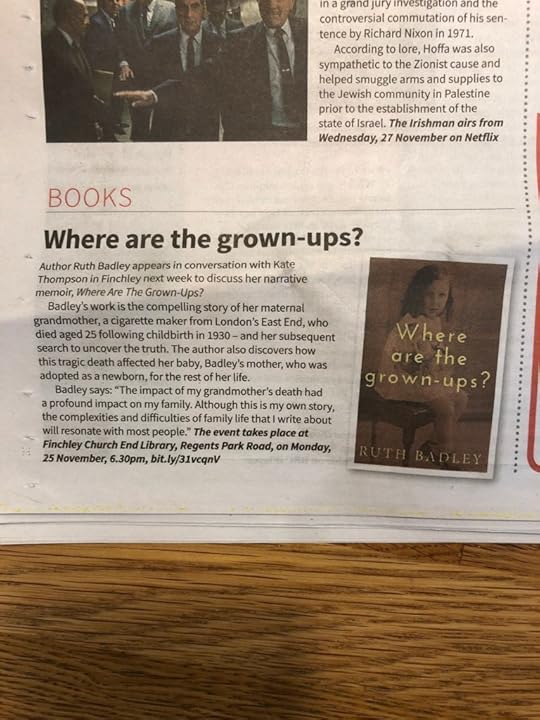 On the arts and culture page
On the arts and culture page
Jewish East End family tragedy the
subject of a new book
The
impact of a hidden family tragedy ripples across three generations in Where are
the Grown Ups? the new narrative memoir by Ruth Badley.
Rose
Dehaan, 25, a Jewish cigarette maker from London’s East End only had time to
name her baby Sylvia before post-partum eclampsia claimed her life.
Whilst
expectations need to be managed, it is well worth being ambitious. Aspects of
my storyline are the stuff of BBC Radio 4 programmes, like Woman’s Hour and
Saturday Live. I’ve made contact with the producers and presenters of both to
make sure I’m on their radar, should a future opportunity arise.
Whatever your genre, the vast array of magazines dedicated to specialist interests may offer another opportunity. With ancestry and genealogy a popular topic and my story steeped in my own family history, I thought it would be worth approaching the associated magazines with a ‘reader story.’
Family Tree
magazine was exceptionally helpful, inviting me to write a guest blog for their
online site, and reviewing my book in print.
Think of yourself as a local author
The ‘local author’ angle is another that worked for me as it will for others. I live on the border of two counties. Newspapers in both Suffolk and Essex approached me for an interview following receipt of suitably tailored versions of my press release.
I could exploit a dramatic personal storyline but local papers give space to authors for many reasons. There might be synergy with an interest group or event in your locality that will make your involvement newsworthy. Giving a free talk to a community group or organising a book signing event with a donation to charity is the bread and butter of local papers. If there is a particularly visual element to your story you might just get a regional television slot on a slow news day. Promoting your own book to the media is time-consuming. Journalists are not always at their desks or in a position to take your call. Find out when they go to press and avoid ringing them the day before as they will be working on the front page and will not be receptive. Be patient, polite and persistent. A presenter on BBC Radio Suffolk has urged me to keep reminding her about an interview slot!
 Local papers frequently feature local author’s stories.
Local papers frequently feature local author’s stories. Column inches
have had a significant impact on my sales and led to speaking opportunities at
a London book festival and for a specialist podcast in America. Sharing positive press coverage on social
media gives valuable third party credibility. The warm glow that comes with a seeing
an article on your work in a newspaper or magazine is not to be underestimated
either, though rarely admitted!
One final
piece of advice. Thank the journalist afterwards. It is always appreciated and
remembered. Further down the writing road, you just might need to contact them
again.
 Positive media coverage can lead to other opportunities with book festivals
Positive media coverage can lead to other opportunities with book festivals

